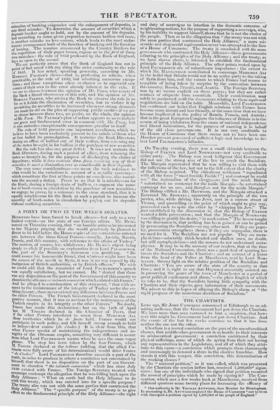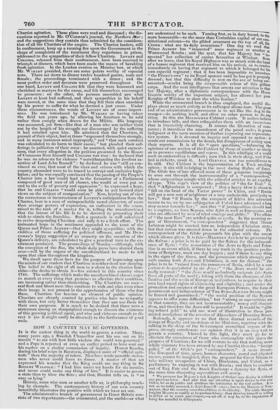THE CHARTISTS.
Lox(; ago, Sir JOHN Caairnma. announced at Edinburgh to an admiring audience, that the Government had put down the Chartists. We have more than once ventured to hint a suspicion, that however this might be, Government had not put down Chartism. And the events of the last few weeks convince us that it has done neither the one nor the other.
Chartism is a rooted conviction on the part of the unenfranchised classes, that middle-class government is as hostile to their interests as aristocratical government: a conviction embittered by their phyical sufferings, some of which do spring from their not having any representatives in the Legislature, and all of which they attribute to this cause—a conviction which prompts them clamorously and unceasingly to demand a share in the elective franchise. How stands it with this temper, this conviction, this determination of the working classes ?
The " national petition," as it was called, which was presented by the Chartists the session before last, received 1,280,000* signatures: has one of the individuals who signed that petition recanted the avowal of principles which he made by signing it ? The Convention, which met a few weeks back at Manchester, received from different quarters some twenty plans for increasing the efficacy of * Our authority is Mr. THOMAS ATT WOOD, then Member for Birmingham. In presenting it, Mr. ATTWOOD implored the House of Commons "not to treat with disrespect a petition signed by 1,280,000 of the people of England." Chartist agitation. These plans were read and discussed ; the discussions reported in Mr. O'Cormost's journal, the Northern Star; and the suggestions they contain thus submitted for the consideration of all the Chartists of the empire. The Chartist leaders, still in confinement, keep up a running fire upon the Government in the shape of complaints of the treatment they experience in prison, addressed to the sympathies of their fellow Chartists. LOVETT and Commis, released from their confinement, have been received in triumph at dinners, which have been made the means of heralding fresh agitation. In the London ovation on Monday last, at which Mr. WAKLEY presided, there are some points worthy of especial note. There sat down to dinner twelve hundred guests, male and female ; the proceedings terminated with a dance ; and the most perfect order and decorum were preserved throughout. On one hand, LovETT and COLLINS felt that they were honoured and cherished as martyrs for the cause, and felt themselves encouraged to persevere : on the other, the persons assembled saw what LOVETT at least had suffered, and their sympathies in his behalf were moved, at the same time that they felt their class ennobled by his power to suffer for what he deemed a just cause. Under these circumstances, the words of LovErr are of some importance. He was introduced by Mr. WAKLEY as having taken the field ten years ago, by allowing his furniture to be sold rather than comply when drawn for the Militia. His language was measured, yet firm—like that of a man who was neither tired out by the length of his struggle nor discouraged by the suffering it had entailed upon him. He admitted that the Chartists, in pursuit of their object, had at times "expressed themselves strongly, and in many instances acted improperly," and "that such conduct was calculated to do harm to their cause;" but pleaded their sufferings in palliation of their error : he asserted, with quiet earnestness, that every allegation in the petition presented to the House of Commons from himself and COLLINS was true : he declared that be was no advocate for violence "notwithstanding the insolent assertion of Lord John Russell" : he declared be was "still as convinced as ever, that most of the vices and crimes with which the country abounded were to be traced to corrupt and exclusive legislation; and he was equally convinced that the passing of the People's Charter into a law would lead to the formation of a Parliament composed of good men of all classes, who would at once put an end to the evils of poverty and oppression " : he expressed a hope, that he and COLLINS "would soon be able to put fbrward their views on the subject of' reorganization." Now, leaving out of view the correctness or incorrectness of LOVETT'S anticipations from the Charter, here is a man of' unimpeachable moral character, of more than average powers of expression, an enthusiast in the cause, raised to the rank of' a martyr for it, telling the unenfranchised that the labour of his life is to be devoted to promoting their wish to obtain the franchise. Such a spectacle is well calculated to revive desponding Chartism and rally it to a fresh effort. The insinuated hope in the sentiment appended to the toast of the Queen and Prince ALBERT—that they might sympathize with the children of those suffering for political offences, and Mr. Del COMBE'S happy suggestion of an amnesty on the occasion of the Queen's delivery, are calculated to give a practical turn to the excitement produced. The proceedings of Monday—although, with the exception of the Sun, the whole daily press have slurred them over—will by the organs of the unenfranehised be made to tell upon that class throughout the kingdom. We dwell upon these facts fbr the purpose of impressing upon the minds of our readers that Chartism is neither dead nor sleeping. The belief in the right of all men to a share in the elective fran
chise—the desire to obtain it—has existed in this country since 1788. The sufferings which make the unenfranchised classes eager to snatch at every thing that promises to alleviate their condition,
are increasing rather than diminishing. The Chartists are men— real flesh and blood men: they continue to wish and plan even when
their image is not present to the apprehension of those who fear them. Chartism has become an element of public opinion. Chartists are already courted by parties who have no sympathy with them, but only flatter themselves that they can use them for their own purposes. It is much to be desired that there were a statesman among us sharpsighted enough to discern the existence of this growing political agent, and wise and virtuous enough to direct it (as it might easily be directed) to the furtherance of good ends.



























 Previous page
Previous page